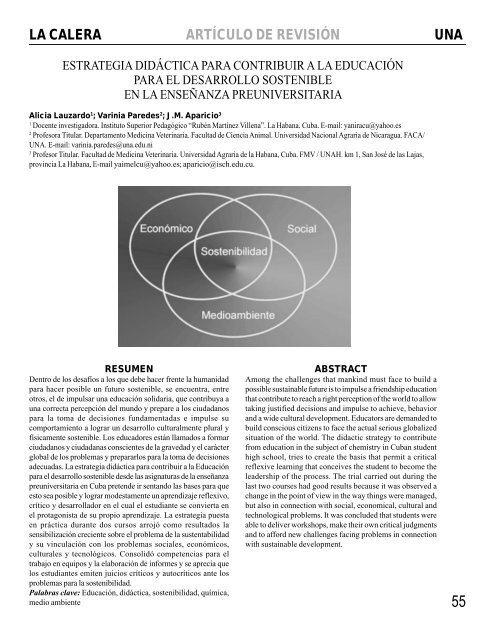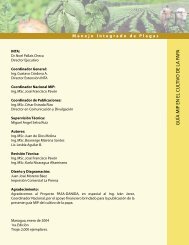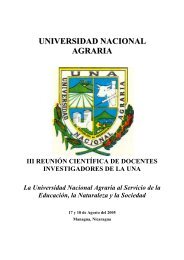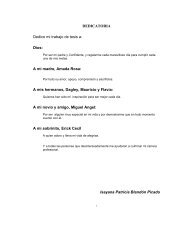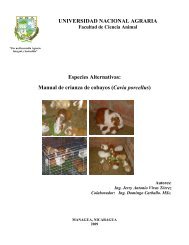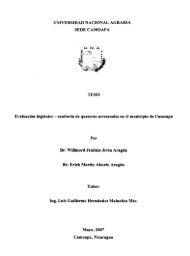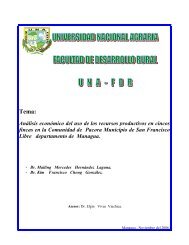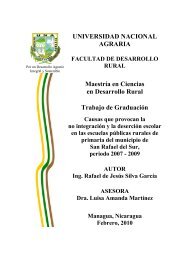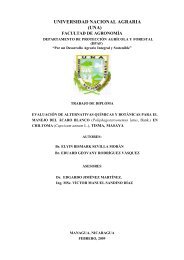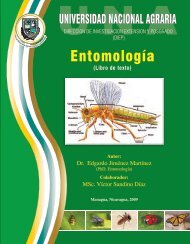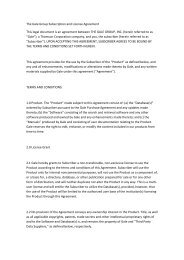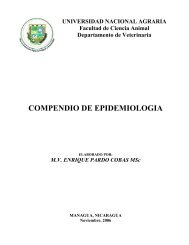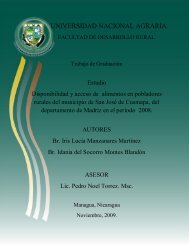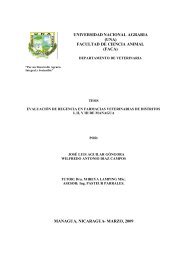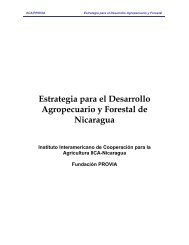LA CALERA - Universidad Nacional Agraria
LA CALERA - Universidad Nacional Agraria
LA CALERA - Universidad Nacional Agraria
Create successful ePaper yourself
Turn your PDF publications into a flip-book with our unique Google optimized e-Paper software.
<strong>LA</strong> <strong>CALERA</strong> ARTÍCULO DE REVISIÓN UNA<br />
ESTRATEGIA DIDÁCTICA PARA CONTRIBUIR A <strong>LA</strong> EDUCACIÓN<br />
PARA EL DESARROLLO SOSTENIBLE<br />
EN <strong>LA</strong> ENSEÑANZA PREUNIVERSITARIA<br />
Alicia Lauzardo1 ; Varinia Paredes2 ; J.M. Aparicio3 1 Docente investigadora. Instituto Superior Pedagógico “Rubén Martínez Villena”. La Habana. Cuba. E-mail: yaniracu@yahoo.es<br />
2 Profesora Titular. Departamento Medicina Veterinaria. Facultad de Ciencia Animal. <strong>Universidad</strong> <strong>Nacional</strong> <strong>Agraria</strong> de Nicaragua. FACA/<br />
UNA. E-mail: varinia.paredes@una.edu.ni<br />
3 Profesor Titular. Facultad de Medicina Veterinaria. <strong>Universidad</strong> <strong>Agraria</strong> de la Habana, Cuba. FMV / UNAH. km 1, San José de las Lajas,<br />
provincia La Habana, E-mail yaimelcu@yahoo.es; aparicio@isch.edu.cu.<br />
RESUMEN<br />
Dentro de los desafíos a los que debe hacer frente la humanidad<br />
para hacer posible un futuro sostenible, se encuentra, entre<br />
otros, el de impulsar una educación solidaria, que contribuya a<br />
una correcta percepción del mundo y prepare a los ciudadanos<br />
para la toma de decisiones fundamentadas e impulse su<br />
comportamiento a lograr un desarrollo culturalmente plural y<br />
físicamente sostenible. Los educadores están llamados a formar<br />
ciudadanos y ciudadanas conscientes de la gravedad y el carácter<br />
global de los problemas y prepararlos para la toma de decisiones<br />
adecuadas. La estrategia didáctica para contribuir a la Educación<br />
para el desarrollo sostenible desde las asignaturas de la enseñanza<br />
preuniversitaria en Cuba pretende ir sentando las bases para que<br />
esto sea posible y lograr modestamente un aprendizaje reflexivo,<br />
crítico y desarrollador en el cual el estudiante se convierta en<br />
el protagonista de su propio aprendizaje. La estrategia puesta<br />
en práctica durante dos cursos arrojó como resultados la<br />
sensibilización creciente sobre el problema de la sustentabilidad<br />
y su vinculación con los problemas sociales, económicos,<br />
culturales y tecnológicos. Consolidó competencias para el<br />
trabajo en equipos y la elaboración de informes y se aprecia que<br />
los estudiantes emiten juicios críticos y autocríticos ante los<br />
problemas para la sostenibilidad.<br />
Palabras clave: Educación, didáctica, sostenibilidad, química,<br />
medio ambiente<br />
ABSTRACT<br />
Among the challenges that mankind must face to build a<br />
possible sustainable future is to impulse a friendship education<br />
that contribute to reach a right perception of the world to allow<br />
taking justified decisions and impulse to achieve, behavior<br />
and a wide cultural development. Educators are demanded to<br />
build conscious citizens to face the actual serious globalized<br />
situation of the world. The didactic strategy to contribute<br />
from education in the subject of chemistry in Cuban student<br />
high school, tries to create the basis that permit a critical<br />
reflexive learning that conceives the student to become the<br />
leadership of the process. The trial carried out during the<br />
last two courses had good results because it was observed a<br />
change in the point of view in the way things were managed,<br />
but also in connection with social, economical, cultural and<br />
technological problems. It was concluded that students were<br />
able to deliver workshops, make their own critical judgments<br />
and to afford new challenges facing problems in connection<br />
with sustainable development.<br />
55


